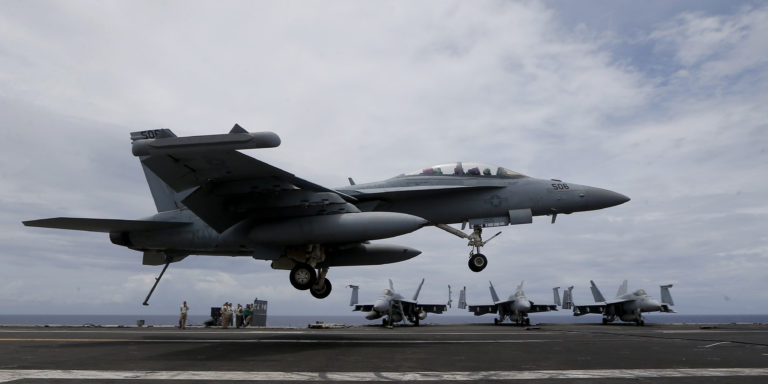INTELBRIEF
March 1, 2021
IntelBrief: Biden Administration Strikes Iranian Proxies

Bottom Line Up Front
- The February 25 retaliatory U.S. air strike on Iran-backed militias in Syria sought to deter attacks by Iranian proxies while minimizing escalation.
- The strike inside Syria represented an effort by the Biden Administration to avoid enmeshing U.S.-Iraq relations with Washington’s approach toward Tehran.
- Such strikes are unlikely to prevent Iran-backed groups from continuing to attack U.S. military personnel in Iraq.
- The military action could put at risk the Administration’s diplomatic campaign to rejoin the 2015 multilateral nuclear deal.
According to the Department of Defense, on February 25, two U.S. F-15 aircraft conducted a “proportional” strike on seven facilities in eastern Syria used by the Iran-backed militias that conducted a February 15 attack on Erbil International Airport and surrounding residential areas in Iraq’s Kurdish-controlled north. The militia attack, the most lethal of several such assaults since President Biden took office, killed a Filipino contractor and injured a U.S. military member based at the airport. U.S. officials blamed the attacks on Kata’ib Hezbollah and Kata’ib Sayyid al-Shuhada, both of which operate in Iraq, as well as in Syria, under the command of Iran’s Islamic Revolutionary Guard Corps - Qods Force (IRGC-QF). In Syria, these and other Iran-backed militia groups are supporting the regime of President Bashar al-Assad. The U.S. strike was intended to demonstrate that the new Administration would not be intimidated by Iran’s early efforts to test it; President Biden, when asked about the U.S. strike, stated: “You [Iran] can’t act with impunity. Be careful.”
Defense Secretary Lloyd Austin indicated that the U.S. retaliation was conducted at his recommendation. As top commander of all U.S. and coalition forces in Iraq, Austin had argued against a full U.S. withdrawal from that country in 2011, in part because a complete U.S. pullout would leave Iraq open to increased Iranian influence. President Biden and Secretary Austin likely viewed the U.S. retaliation as benefitting the floundering efforts of Iraqi Prime Minister Mustafa al-Kadhimi to rein in Iran-backed militias. Yet, by striking the Iraqi militias’ facilities in Syria the new U.S. administration sought to avoid strain in U.S.-Iraqi relations. Under similar circumstances, the Trump administration on several occasions retaliated against Iran-backed militias inside Iraq itself, but in so doing fueled opposition to the Iraqi government - and to the continuing U.S. military presence in Iraq - by pro-Iranian politicians and the politically powerful commanders of the Iran-backed militias. The United States has had no significant diplomatic relations with the Assad regime since the uprising there began in 2011, and the U.S. airstrike in eastern Syria will therefore not affect relations with the Syrian government.
The U.S. retaliatory strike was a relatively low-risk signal of U.S resolve to Tehran, whose strategic “playbook” continues to frustrate U.S. and U.S. allied policy in several locations throughout the region. Yet, in light of its limited scope, and the killing of as many as 17 Iraqi militia fighters, the retaliation might not deter future such attacks by Iran’s allies. Wider-scale strikes during the Trump Administration – including the January 3, 2020 strike that killed IRGC-QF commander Qasem Soleimani and Katai’ib Hezbollah leader Abu Mahdi al-Muhandis – did not cause the Iran-backed militias to cease their attacks on U.S.-manned facilities or to come firmly under control of the Iraqi command structure.
Some U.S. critics of the U.S. strike noted its potential to disrupt Biden administration efforts to engage Iran diplomatically on a full U.S. and Iranian restoration of the seminal 2015 multilateral Iran nuclear accord. Supporters of the strike argued that the action could instead increase the U.S. leverage in any new talks by signaling that the new Administration is not seeking a restoration of the nuclear deal at any price. The strike puts Iran on notice that, no matter the prospects for U.S.-Iran diplomatic engagement, Iran will suffer consequences if it continues to stoke attacks on U.S. personnel throughout the region. The Administration undoubtedly calculated, likely correctly, that the strike was not extensive enough to cause Iran to walk away from the proposed diplomacy, although Iran apparently rejected an EU proposal to arrange direct nuclear talks with the Biden administration. Iran might respond by instigating renewed attacks on U.S. personnel in Iraq or, alternately, by escalating elsewhere in the region. Iran could, for example, resume actions against commercial shipping in the Persian Gulf or encourage its Houthi allies in Yemen to conduct further missile or drone attacks on Saudi Arabia. Any U.S. or Iranian military action in the region, no matter the intent, has the potential to cause U.S.-Iran escalation and derail any planned diplomacy.